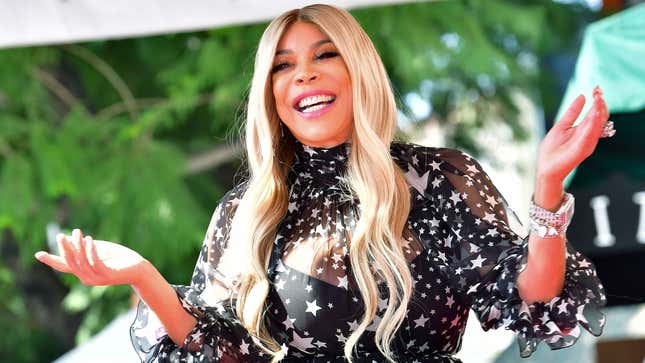

Wendy Williams is a showbiz scholar who studied tabloids as though they were canon. To the talk show host, “entertaining” and “salacious” are practically synonymous, and this sensibility makes her the most multivalent of celebrity journalists. At her best, she has made it impossible to stop listening or watching even when her audience feels like they would rather not, and she’s kept interview subjects engaged even when they’d clearly rather be anywhere but in her interrogation chair. She’s credited Howard Stern as an influence, and that’s apparent in her unflinching style, but she also has Joan Rivers’s gift of saying odious shit and getting away with it unscathed.
Her kamikaze charm goes practically undefined in two upcoming Lifetime productions about her life, the fictionalized biopic Wendy Williams: The Movie and a documentary called Wendy Williams: What a Mess. In both, Williams just is, and she just is fascinating. Given her badgering of stars for the 35 years she’s been in the business, anything less than putting herself through the ringer would be practically hypocritical. Luckily, What a Mess does just that and then some. It frequently resembles a therapy session, as Williams sits feet up on her couch in her Manhattan apartment in one recurring interview setup and purges her feelings about her recent split from her husband of 22 years, Kevin Hunter. Williams cries in practically every segment, she shouts, she repeats, “Oh my gosh” some half dozen times during a particularly painful recollection. During a recent Zoom press conference, Williams predicted her fans would react to her movie(s) in this way: “They’ll probably say I can’t believe she had the guts to be so raw and honest.” At that moment, she was like a painter taking a few steps back from the canvas to admire her own work.
Excerpts of that radio interview, in which a belligerent Houston (shortly after her infamous “crack is wack” interview with Diane Sawyer in 2002) called Williams cold and Williams had the wherewithal to keep her on the phone for 28 minutes, play during What a Mess, as do excerpts of Williams asking Mariah Carey about her sex life and plastic surgery (Carey, naturally, declined to answer). Repeatedly, we see footage of Williams getting told to her face what people think of her, and as someone who helped pioneer the hip-hop gossip industry during the music genre’s commercial ascendancy, it’s often negative. Williams lets it roll off her back and keeps going. It’s a stunning management of ego on display: Williams refuses to let on if she takes any of it personally, because she knows she’s too good at her job to let it get in the way. She can be such a dogged reporter that the very skill required becomes invisible.
Williams piles on the painful memories in the two-hour Mess: Early on in her radio career, a “one-hit wonder” who went to No. 1 on the R&B chart raped her. (She won’t name names, though given that this happened in the late ‘80s/early ‘90s, I have my suspicions.) She had two miscarriages after carrying for months, and was extremely public about both. When she got pregnant again and requested to do her show on bed rest, her (male) bosses reluctantly assented. She calls them “assholes.” That pregnancy resulted in her only child, Kevin, named after her ex. She had bulimia, though she says reading about one star’s rotting teeth as a result of the disorder was all it took for her to stop. She did a lot of cocaine—five times a week when she was doing a graveyard show. “No big deal became a big deal,” she recalls.
She is unsparing but fair about Hunter, whom she accuses of emotional abuse but not physical. “He’s just a weird man with a whole bunch of issues that I’m glad I’m rid of,” she says. Her modesty doesn’t cloud her sense of accomplishment. Facts are facts. “I was a made woman before I met him and I would have made this without him,” she says of the man who managed her career, and if you have any sense of Williams’s landmark radio career, you know she’s right.
Naturally, there are holes. Her odd on-air behavior is rarely explained (her infamous fainting episode is mentioned but briefly), and her frequent hiatuses are glossed over. Her relationship with former sidekick Charlamagne Tha God barely gets a nod in either movie, though he does show up as a talking head in Mess. It’s a gracious and supportive turn from Charlamagne, who says that Hunter was “a real joy killer” and that “Kevin has a way of making you think your life will not exist without him.” If Charlamagne holds a grudge after falling out with Williams, you can’t tell.
One of the most entertaining aspects of both movies is the portrayal of Williams’s feud with ’90s R&B girl group Total (who were signed to Sean “Diddy” Combs’s Bad Boy Records). On the radio, Williams talked so much shit about their finances and sexualities that they one day showed up outside of the studio to fight her. In Mess, Total member Kima Raynor recalls Williams exiting the building and Hunter immediately blocking access to her and shuttling her in the car. As they peeled off, Williams opened her sunroof and held up her middle finger at the stunned group. That effectively ended the beef, Raynor explains. They couldn’t help but laugh. That’s Wendy for you.